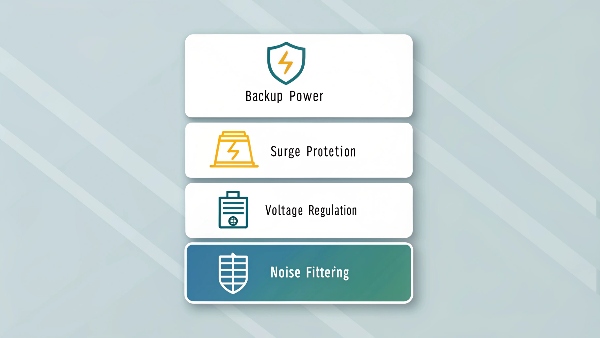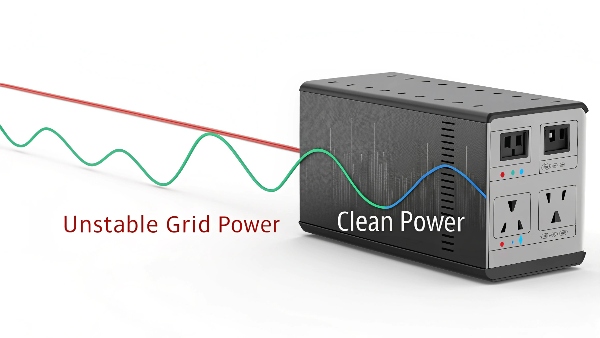Power fails, and your critical systems crash. This downtime costs money, corrupts data, and damages expensive equipment. A UPS provides a shield of clean, constant power, protecting your assets.
A UPS provides immediate battery backup during outages, preventing data loss. It also protects against power surges, sags, and "dirty" power that can silently damage sensitive electronics over time. This ensures both operational continuity and equipment longevity.

Transition Paragraph:
In my ten years at Daopulse, I've designed power solutions for every industry imaginable. While a UPS has many benefits, my perspective was shaped by a client like Mr. Li, a Procurement Manager for a hospital. For him, a UPS was not just beneficial; its absence was dangerous. In critical medical fields, a stable power supply can be the difference between a normal procedure and a life-threatening emergency. This simple insight—that a UPS moves from a benefit to a necessity—is the most important reason to understand its value.
What are the main advantages of a UPS power supply?
You worry about more than just blackouts. Small power fluctuations are invisible but slowly kill your expensive equipment. A UPS does more than backup; it actively cleans your power.
Key advantages include instant battery power to prevent data loss, voltage regulation to protect from sags and surges, power conditioning to filter electrical noise, and enabling a safe, automated shutdown of equipment.
Dive deeper Paragraph:
The advantages of a UPS go far beyond a simple battery. The first advantage, instant backup power, is the most obvious. The switch from grid to battery power happens in milliseconds, so your computers and servers don't even notice the grid has failed. This is crucial for preventing data corruption. Second, many of our UPS models offer voltage regulation. This feature, common in Line-interactive units, corrects for minor brownouts and surges without switching to battery power. This protects your devices from the stress of unstable power and saves the battery for a true blackout. Third, for the most sensitive applications, Online UPS systems provide perfect power conditioning. They completely rebuild the power signal, filtering out all the electrical "noise" that can interfere with lab equipment or data integrity. Finally, a UPS offers intelligent shutdown. Through a simple USB or serial connection, it can signal your server to automatically save all work and shut down gracefully before the battery runs out. This complete, multi-layered protection is the true advantage of a modern UPS.
What are the 4 main functions of an uninterruptible power supply?
You think a UPS is just a battery box. This limited view means you might be missing its most valuable protective features. A UPS has four distinct functions working together.
A UPS performs four key functions: 1) Backup Power during an outage, 2) Surge Protection against voltage spikes, 3) Voltage Regulation to smooth out sags, and 4) Power Filtering to remove electrical noise.

Dive deeper Paragraph:
As an OEM/ODM manufacturer, we engineer our products to perform these four critical functions flawlessly. It's important for System Integrators and Procurement Managers to understand what each one does, as the quality of these functions varies between UPS types.
The Four Core UPS Functions
| Function | Description | Why It's Important |
|---|---|---|
| Backup Power | Instantly provides power from its internal batteries the moment the main supply fails. | Prevents hard shutdowns, data loss, and operational downtime. |
| Surge Protection | Absorbs sudden, massive voltage spikes (like from a lightning strike) before they can reach your equipment. | Protects sensitive electronic components from being instantly destroyed. |
| Voltage Regulation | Automatically corrects for minor but persistent low voltage (sags) or high voltage (surges) from the grid. | Reduces stress on power supplies, extends hardware life, and preserves the battery. |
| Power Filtering | Removes electromagnetic and radio frequency interference (EMI/RFI), also known as "dirty power" or noise. | Ensures clean power for sensitive lab, medical, or audio/video equipment. |
A basic Standby UPS focuses on backup and surge protection. A Line-interactive UPS adds good voltage regulation. An Online (Double-conversion) UPS excels at all four, offering the ultimate protection by completely regenerating the power signal. Matching the right functions to the application is key.
What is the real point of having a UPS system?
The power in your building seems stable enough. So you might wonder if a UPS is an unnecessary expense for your business. The point is not just avoiding blackouts; it's guaranteeing stability.
The point of a UPS is to create a buffer of perfect, reliable power between the unpredictable utility grid and your critical equipment. It ensures business continuity by preventing downtime from any power disturbance, big or small.

Dive deeper Paragraph:
When I talk to clients, I boil the "point" of a UPS down to three things: risk management, data integrity, and asset protection. First, a UPS is a risk management1 tool. A procurement manager's job is to minimize risk, and unstable power is a major operational risk. Installing a certified UPS from a trusted supplier like us is a direct and effective way to mitigate that risk. Second, the point is to protect your most valuable asset: data integrity. A power blip can corrupt a database or an entire operating system. The cost to recover from that far exceeds the cost of the hardware itself. Third, it's about asset protection2. You invest thousands, or even millions, in servers, networking gear, and specialized machinery. Feeding this expensive equipment dirty, fluctuating power is like putting cheap fuel in a high-performance engine—it causes premature wear and tear. A UPS protects this investment by ensuring it only receives clean, stable power, maximizing its lifespan and your return on investment.
Why is it strongly recommended to use a UPS?
You're on the fence about a UPS purchase. You need a clear, final reason to justify the cost and effort. A UPS is recommended because it's the only device that solves multiple power problems.
It is recommended because the cost of a single power-related failure—in terms of lost data, damaged hardware, or business downtime—almost always exceeds the cost of a quality UPS. It's a proactive investment in reliability.

Dive deeper Paragraph:
I strongly recommend a UPS because it is fundamentally an economic decision. The initial cost of a UPS is small when compared to the potential cost of not having one. Let’s break down the true cost of a single power failure. You have lost productivity from every employee who cannot work. You have potential lost revenue if your sales or e-commerce systems go down. You have the direct cost of replacing hardware damaged by a surge. And you may even have huge costs for specialized data recovery services. All of these risks are managed by one device. As an OEM/ODM provider with options from cost-effective lead-acid units to long-life lithium battery systems, we make this protection accessible for any budget. But the recommendation becomes an absolute necessity in critical environments. For the hospital, the "cost of failure" isn't measured in money; it's measured in patient safety. That is why a UPS is not just recommended; it's essential.
Conclusion
A UPS provides vital power backup, surge protection, and voltage regulation. It is a critical investment to protect your data, your equipment, and to ensure your operations continue uninterrupted.

